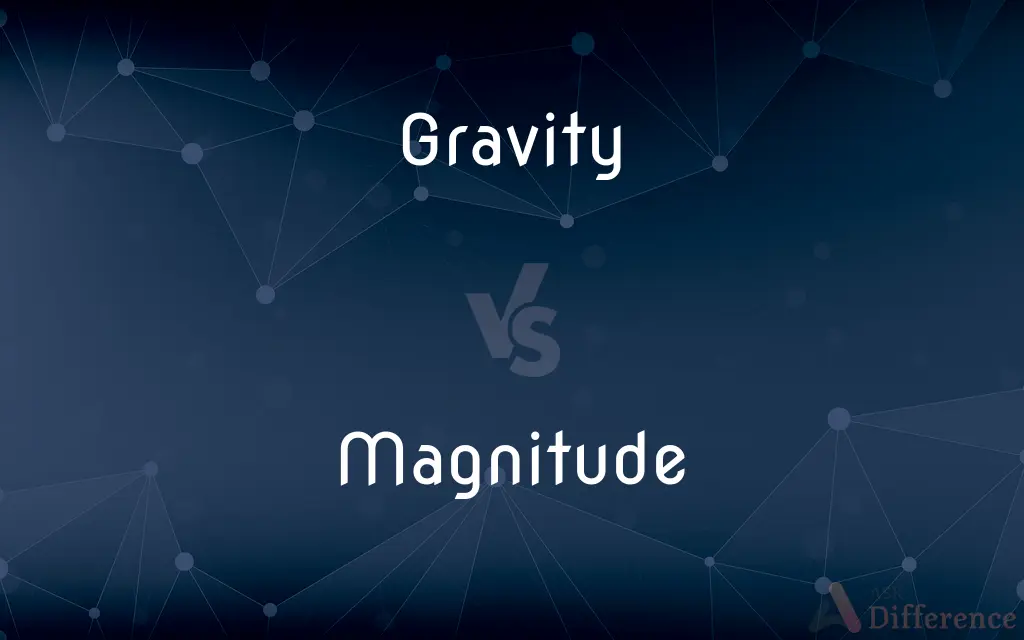Gravity vs. Magnitude — What's the Difference?

Difference Between Gravity and Magnitude
ADVERTISEMENT
Compare with Definitions
Gravity
Gravity (from Latin gravitas 'weight'), or gravitation, is a natural phenomenon by which all things with mass or energy—including planets, stars, galaxies, and even light—are attracted to (or gravitate toward) one another. On Earth, gravity gives weight to physical objects, and the Moon's gravity causes the ocean tides.
Magnitude
Greatness of rank or position
"such duties as were expected of a landowner of his magnitude" (Anthony Powell).
Gravity
The force that attracts a body towards the centre of the earth, or towards any other physical body having mass.
Magnitude
Greatness in size or extent
The magnitude of the flood was impossible to comprehend.
Gravity
Extreme importance; seriousness
Crimes of the utmost gravity
ADVERTISEMENT
Magnitude
Greatness in significance or influence
Was shocked by the magnitude of the crisis.
Gravity
Solemnity of manner
Has the poet ever spoken with greater eloquence or gravity?
Magnitude
The brightness of a celestial body on a numerical scale for which brighter objects have smaller values. Differences in magnitude are based on a logarithmic scale that matches the response of the human eye to differences in brightness so that a decrease of one magnitude represents an increase in apparent brightness by a factor of 2.512. Also called apparent magnitude.
Gravity
The natural attraction between physical bodies, especially when one of the bodies is a celestial body, such as the earth.
Magnitude
A unit on such a scale of brightness.
Gravity
See gravitation.
Magnitude
A number assigned to a quantity so that it may be compared with other quantities.
Gravity
Grave consequence; seriousness or importance
They are still quite unaware of the gravity of their problems.
Magnitude
A property that can be described by a real number, such as the volume of a sphere or the length of a vector.
Gravity
Solemnity or dignity of manner.
Magnitude
(Geology) A measure of the amount of energy released by an earthquake, as indicated on the Richter scale.
Gravity
The state or condition of having weight; weight; heaviness.
Magnitude
The absolute or relative size, extent or importance of something.
Gravity
The state or condition of being grave; seriousness.
I hope you appreciate the gravity of the situation.
Magnitude
(countable) An order of magnitude.
Gravity
(music) The lowness of a note.
Magnitude
(mathematics) A number, assigned to something, such that it may be compared to others numerically
Gravity
(physics) The force at the Earth's surface, of the attraction by the Earth's masses, and the centrifugal pseudo-force caused by the Earth's rotation, resulting from gravitation.
Magnitude
(mathematics) Of a vector, the norm, most commonly, the two-norm.
Gravity
Gravitation, the universal force exercised by two bodies onto each other.
Magnitude
(astronomy) A logarithmic scale of brightness defined so that a difference of 5 magnitudes is a factor of 100.
Gravity
(physics) Specific gravity.
Magnitude
(uncountable) The apparent brightness of a star, with lower magnitudes being brighter; apparent magnitude
Gravity
The state of having weight; beaviness; as, the gravity of lead.
Magnitude
(countable) A ratio of intensity expressed as a logarithm.
Gravity
Sobriety of character or demeanor.
Magnitude
(seismology) A measure of the energy released by an earthquake (e.g. on the Richter scale).
Gravity
Importance, significance, dignity, etc; hence, seriousness; enormity; as, the gravity of an offense.
They derive an importance from . . . the gravity of the place where they were uttered.
Magnitude
Extent of dimensions; size; - applied to things that have length, breadth, and thickness.
Conceive those particles of bodies to be so disposed amongst themselves, that the intervals of empty spaces between them may be equal in magnitude to them all.
Gravity
The tendency of a mass of matter toward a center of attraction; esp., the tendency of a body toward the center of the earth; terrestrial gravitation.
Magnitude
That which has one or more of the three dimensions, length, breadth, and thickness.
Gravity
Lowness of tone; - opposed to acuteness.
Magnitude
Anything of which greater or less can be predicated, as time, weight, force, and the like.
Gravity
(physics) the force of attraction between all masses in the universe; especially the attraction of the earth's mass for bodies near its surface;
The more remote the body the less the gravity
The gravitation between two bodies is proportional to the product of their masses and inversely proportional to the square of the distance between them
Gravitation cannot be held responsible for people falling in love
Magnitude
Greatness; grandeur.
Gravity
A manner that is serious and solemn
Magnitude
Greatness, in reference to influence or effect; importance; as, an affair of magnitude.
The magnitude of his designs.
Gravity
A solemn and dignified feeling
Magnitude
See magnitude of a star, below.
Magnitude
The property of relative size or extent;
They tried to predict the magnitude of the explosion
Magnitude
A number assigned to the ratio of two quantities; two quantities are of the same order of magnitude if one is less than 10 times as large as the other; the number of magnitudes that the quantities differ is specified to within a power of 10
Magnitude
Relative importance;
A problem of the first magnitude
Share Your Discovery

Previous Comparison
Psychotropic vs. Psychoactive
Next Comparison
Mat vs. Met













































